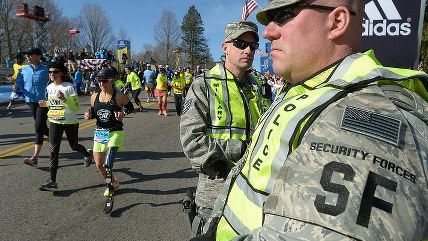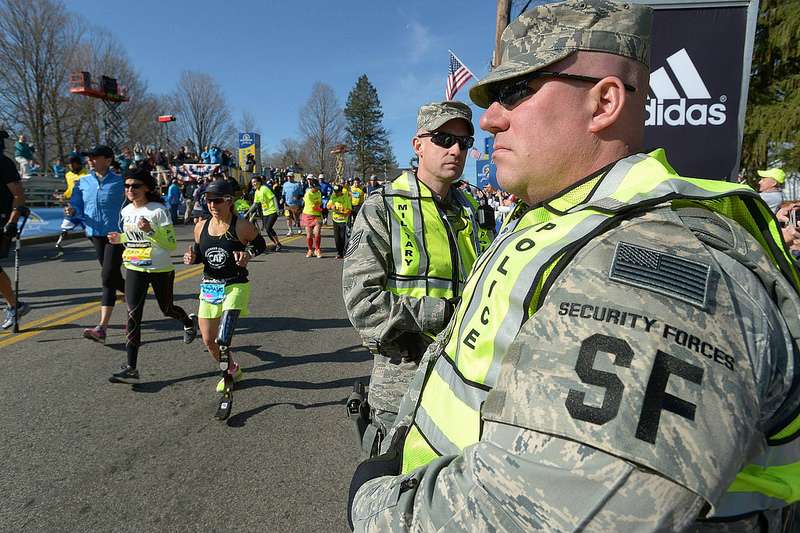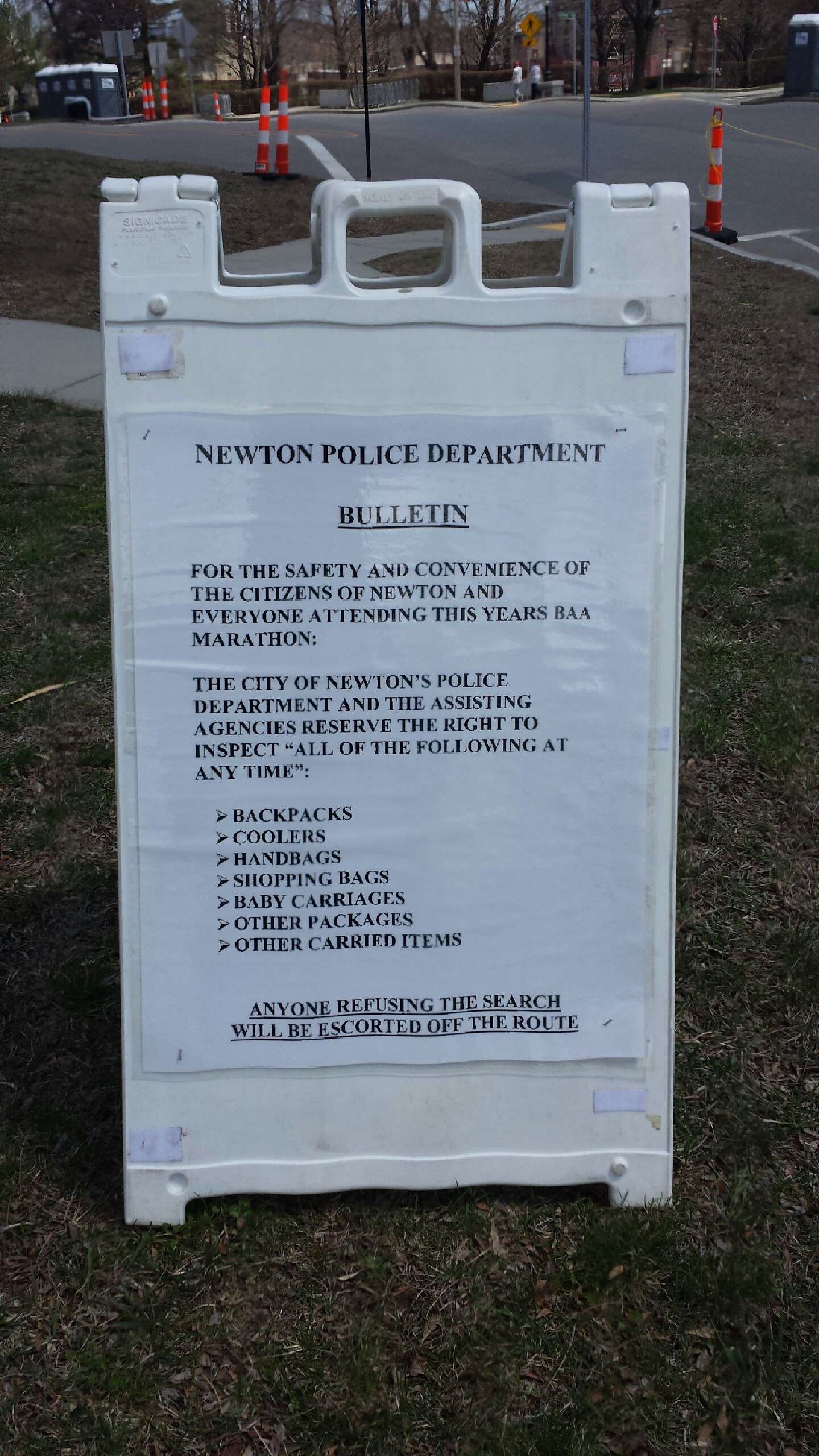Boston Marathon-Style Intrusive Security Has 'Institutionalized Fear'
If we treat everyday life as a permanent state of emergency, we render ourselves helpless and at risk.


One year after a bloody bombing that made international headlines, the Boston Athletic Association, organizer of the Boston Marathon, was blunt about the new environment surrounding what was once a fun outing. "Spectators approaching viewing areas on the course, or in viewing areas on the course, may be asked to pass through security checkpoints, and law enforcement officers or contracted private security personnel may ask to inspect bags and other items being carried."
Warning signs along the marathon route pulled even fewer punches. One, posted by the Newton Police Department, not only threatened suspicionless searches, but cautioned that "anyone refusing the search will be escorted off the route."
Note that the route consists of 26 miles of public roads.
"I don't think there's a lot of safety to be gained," security expert Bruce Schneier says of the measures. "It's really for a show of force" rather than to prevent a recurrence of something like 2013's terrorist attack. Schneier believes that any new plot would have come off relatively unimpeded by the police, National Guardsmen, and checkpoints at this year's event. The very public security presence would be left to respond after the fact.
His doubts echo those of Ronald K. Noble, a former Treasury Department official and now secretary general of Interpol, the international police-coordination organization, who mused after the Westgate mall shooting in Kenya, "How do you protect soft targets? That's really the challenge. You can't have armed police forces everywhere."
A foot race route covering 26 miles, plus venues, would seem to be a very soft target, and one difficult to fully cover with police.
Not that there's much chance of those police having to respond to a terrorist attack, despite the horrors visited on attendees at the 2013 Boston Marathon. The U.S. State Department reports that 12 Americans were killed or injured around the world by terrorism in 2012. That was down from 31 in 2011. Even the roughly 3,000 people murdered by the 9/11 attacks were a small fraction of the over 42,000 killed in car accidents (PDF) that year.

Reason's own Ron Bailey calculates that an American's chance of dying in a terrorist incident is about one in 20 million—less than the chance of being struck by a lightning bolt.
But to combat that one in 20 million possibility, America's high-profile events and public places are increasingly locked down. The Superbowl in January featured similarly tight security, with checkpoints, restrictions, surveillance, and searches imposing a high cost in return for uncertain improvements in safety against a vanishingly small risk.
The security presence "has institutionalized fear," warns Schneier. "It reinforces the notion that terrorism is a big deal, when in fact…it's a really minor risk."
And institutionalized anything has a way of becoming a permanent part of the landscape. Officials and agencies are loath to surrender new powers, budgets, and toys.
"Police may implement what is billed as a temporary security regime, but then turns out to be permanent," warns Kade Crockford, director of the Technology for Liberty initiative at the American Civil Liberties Union of Massachusetts. "All too often, when law enforcement beef up security for special events like political conventions or major sports competitions, the surveillance apparatus that's established remains firmly in place long after the crowds are gone."
Crockford worries that some or all of the security measures implemented for the marathon, such as an artificial intelligence system piggybacked on the backbone of the region's government surveillance camera network, may remain long after the runners are gone.
The dangers of terrorism are remote, the measures taken against them lingering—and there are also dangers in forcing people to submit to increasingly intrusive measures and to grow dependent on them.
"A culture of learned helplessness does create a risk," cautions Schneier.
Schneier points to the passenger revolt on Flight 93 that thwarted one of the four teams of 9/11 terrorists (though at the cost of the lives of the passengers) as an example of people taking responsibility on themselves when formal security measures couldn't do the job. Similarly, passengers and crew subdued "shoe bomber" Richard Reid in 2001 and Umar Farouk Abdulmutallab in 2009. Would people thoroughly browbeaten by security officials scrutinizing them and pawing through their possessions be so willing to stand up against terrorists?
The move toward checkpoints and bans on, in the words of race organizers, "weapons or items of any kind that may be used as weapons," at the Boston Marathon may be precisely the wrong response to a rare, but fluid danger when, as Interpol's Noble points out, armed police can't protect every possible target.
Recognizing the obvious limits of security measures after the Westgate mall shooting, Noble also commented, "You have to ask yourself, 'Is an armed citizenry more necessary now than it was in the past with an evolving threat of terrorism?' This is something that has to be discussed."
Empowering—even just allowing—regular people to respond to rare terrorist incidents, like the passengers on Flight 93 and the people who subdued Richard Reid in 2001 and Umar Farouk Abdulmutallab, might not only be more effective against terrorists than a "show of force," it would also allow us to live normal lives. We could go about our business, responding only in the unlikely event that a threat actually arose.
"We can't treat everyday life as if we are living in a permanent state of emergency," notes the ACLU's Crockford.
Well…we could. But then we'd be rendered helpless and at risk by institutionalized fear.
Editor's Note: As of February 29, 2024, commenting privileges on reason.com posts are limited to Reason Plus subscribers. Past commenters are grandfathered in for a temporary period. Subscribe here to preserve your ability to comment. Your Reason Plus subscription also gives you an ad-free version of reason.com, along with full access to the digital edition and archives of Reason magazine. We request that comments be civil and on-topic. We do not moderate or assume any responsibility for comments, which are owned by the readers who post them. Comments do not represent the views of reason.com or Reason Foundation. We reserve the right to delete any comment and ban commenters for any reason at any time. Comments may only be edited within 5 minutes of posting. Report abuses.
Please to post comments


But the move toward checkpoints and bans may be precisely the wrong response to a rare, but fluid danger, writes J.D. Tuccille
It doesn't matter, because this isn't only about that. It's the double whammy of security theater and the threat of lawsuits. If they do nothing, the chance of something happening again is very low, but if it should, they will get the pants sued off of them. Security theater reassures the pant-wetting types so they don't stay home, and it provides cover for lawsuits should anything happen again. It is, unfortunately, the most logical response of an event host, for purely illogical human reasons (fear and blame).
Also, they get overtime.
... and the cry bullies get to pretend that they are providing a valuable service and that they are risking their lives while not actually undergoing much risk.
It's more dangerous to be in front of the dash-cam than to be behind it.
That doesn't mean we shouldn't try!
We should try, realistically. But what we have now is a sham.
I wish they would have provided the rest of this quote. IIRC, the head of Interpol was advocating that we proles be allowed to keep and bear arms for safety, instead of relying on an overbearing security state. For some reason, I dont see this reported on any news sites.
Ill try to find a link.
I stand corrected: From ABC's site:
http://abcnews.go.com/Blotter/.....d=20637341
Preaching to the saved!
Now how do we get the political weenies to understand this, and act accordingly?
Terrorism is not a minor risk. It doesn't happen often in the US, but it can potentially erase many more lives in a single strike than mass shootings. And unlike random mass shootings, terrorist acts are carried out by better funded organizations.
If the older brother (undocumented at the time, I believe) was deported after abusing his girlfriend, then this tragedy probably doesn't happen. Americans favor amnesty of some sort, but they'll never accept open borders.
Terrorism is not a minor risk.
Depends how you define it. "In the US, the chance any one person has of this happening to them...." Yeah, it's a minor risk.
"Erase many more lives" - than, say, a chemical spill in Bhopal, or a few drone strikes in Pakiland. Oh, wait, some people may thing the latter IS terrorism....YMMV.
Crockford worries that some or all of the security measures implemented for the marathon...may remain long after the runners are gone.
No wai! That's just...CRAZY talk, JD!
Why don't they just bar all spectators and televise the runners crossing the finish line? Or just create a 3d animated representation of it.
Just have them run Marathon on treadmills.
I was a Marine and a Soldier - and I just love seeing cops play dress up. I wonder how they would feel if I walked around in an actual police uniform for the fuck of it?
I was a Marine and a Soldier
At the same time?
Come on, use your head. Obviously, he served some time in one branch and then switched to the other. Saw plenty of Marines get offered bonuses to reenlist into Army and there was even a program for us that served as medics for USMC to reenlist in Army and get a commission after finishing PA school.
Drake, I share your outlook on these costumed "Wannabe Warriors"
Try turning your sarcasm meter off, then back on and see if that fixes the problem.
Well...PH2050 is correct.
Since I will always be a Marine, I was a Soldier in the National Guard and a Marine at the same time.
So where does this author stand on the GA law passed today which allows folks in bars, schools and churches with their guns?
That would seem a similar "fear based" type of society...certainly those who don't have the guns will be in a bit more fear, especially when folks start getting drunk, angry, etc.
That would seem a similar "fear based" type of society...certainly those who don't have the guns will be in a bit more fear, especially when folks start getting drunk, angry, etc.
Not necessarily. It's a society which chooses to use a distributed, decentralized security based on self-reliance.
The police can't be everywhere.
Except - those guns were *already* there. Just because it was illegal doesn't mean it wasn't happening.
That's why we have gun crime despite all the laws against it.
Wild West! Blood in the streets! Except that doesn't happen.
If you are getting drunk and angry at church maybe you should try a different denomination?
So, Craig. Are you saying that we would be safer if Law Abiding American's were not allowed to carry weapons?
I disagree.
I think "it depends".
We'll never know since all the research into gun violence has been shut down...by those who don't want to know - or who don't want us to know.
Given the choice between the right to able to carry in a bar...and the right to accurate information regarding public health, I think the second is much more important when taken over the entire society.
Wow man I never thought of that dude, never.
http://www.GotsDatAnon.tk
Simply stated, we have been "terrorized"?
The 9/11 perpetrators may not (I hope) have their virgins in Paradise, but they may well be having a wicked laugh somewhere at our expense.
The terrorists, after all, won.
If they do nothing, the chance of something happening again is very low, but if it should, they will get the pants sued off of them.
Public Safety was not, is not, and never will be, the goal. It is all about power. Al Qaeda lost the battle, and won the war. They wanted to destroy that which made America unique, and they did. Those who wanted an unlimited police state were making very slow progress, inch by inch, over decades. Then, with 9/11, their prayers were answered. They had the perfect excuse to go full bore, eviscerate the Bill of Rights and the Constitution completely, and enact their vision of a Police State on the Land of the Free.
As much as I felt bad for the people living under the old USSR, I sometime think the world was better with the existence of an example of the dangers of a totalitarian state.
Do you think the NSA would be able to get away with their BS, for example, if we were still the "free good guys" locked in a cold war with "the Evil Empire"?
Was it Lovecraft who wrote of sacrificing one child to misery so that everyone else could be happy? Hell, its not like the Russian, Ukrainian, etc., people are that much better off now anyway... well maybe the Poles and Georgians... but who else? The Slavs and Croats? Uzbekistanians? Shit, I almost find myself wishing "good luck" to Putin in his goal of resurrecting the USSR...
At the end of the day the terrorist are winning when we change our very way of life because of the occasional attack. As the author mentions auto accidents take far more American lives, but we still drive. Security is important, but selling fear to the American public plays into the goals of these terrorist groups.
Selling fear has more than one benefit. It's what drives consumerism, separatism (divisiveness) and many other factors which are very profitable to the corporate interests who run this country and most of the world.
However, I would be remiss in blaming them for giving the masses what they clamor for. It's not an accident that "gated and secure" communities have become so popular here in the last 2 decades. Everyone is scared of everyone else - and this produces profits galore, whether from the war machine or other sectors. The empty lives which result from our lack of community drive us to buy and consume more and more in an attempt to fill the emotional hole.
Way of Life? What's that? In the past, the American Way of Life was defined as a good job with benefits and security allowing one household member to work and still support a home, car and education for the children...to say nothing of health care.
That ship sailed in the 1980's with the cheering of union-busting, the race to the bottom, the fairy tale of trickle down, etc.
On an individual basis I still believe each of us can be relatively free and successful. But as far as the vaulted Way of Life thing, that's statistically over.
good